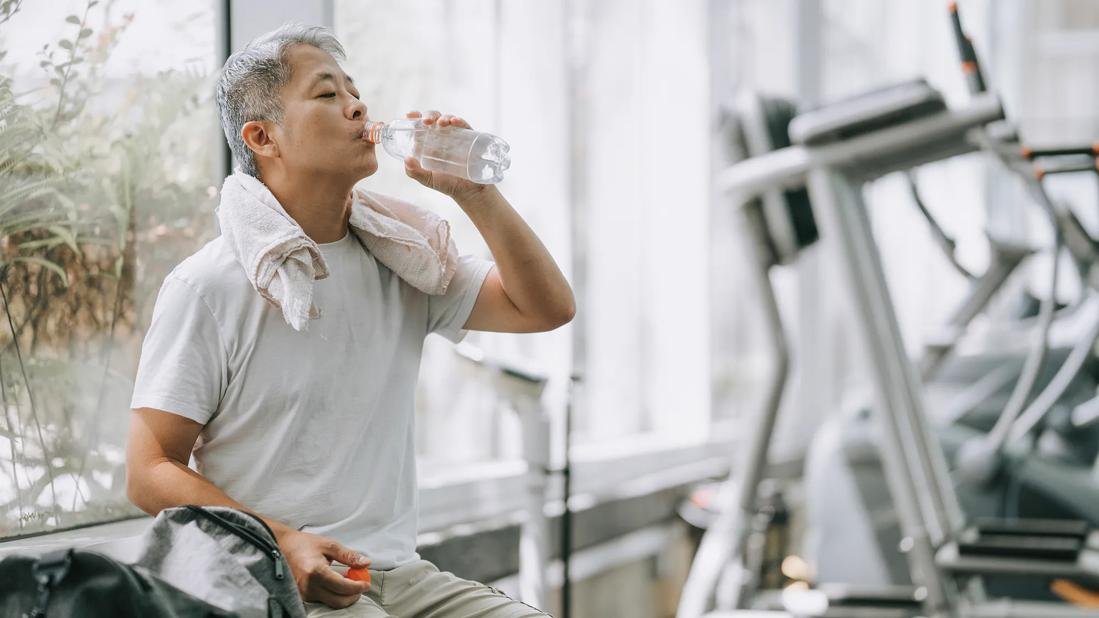Getting stronger, feeling better and staying active isn’t just possible — it’s doable
Let’s face it — your bounce-back isn’t what it used to be. Whether it’s a round of golf, wrangling grandkids or doing yard work, recovery takes longer as you age. But the good news? It’s not too late. You can get fit again after 50. And you don’t need a fancy gym or a personal trainer to do it.
Advertisement
Cleveland Clinic is a non-profit academic medical center. Advertising on our site helps support our mission. We do not endorse non-Cleveland Clinic products or services. Policy
We asked a registered dietitian and an exercise physiologist to share their top tips for getting stronger, boosting energy and just generally feeling better — starting now.
Yes — and you don’t have to go all-in on day one.
“You naturally lose muscle mass as you age,” says exercise physiologist Chris Travers, MS. “But that just means it’s time to tweak your routine, not throw in the towel.”
“Think of your 50s as a reset,” adds Kate Patton, MEd, RD, CSSD, LD. “It’s a great time to make healthy changes and build habits that stick.”
Water helps everything — from digestion to prostate health. But as you age, your thirst queue may not be as noticeable.
“Sometimes, your body doesn’t signal thirst as clearly,” Patton explains. “That means you may need to schedule your water intake.”
Try this:
And skip soda. Sugary drinks can mess with your metabolism. They can also raise your risk of heart disease and prostate problems.
Too much sodium raises blood pressure and heart disease risk. And if you’re not getting enough potassium, your risk is even higher.
Here’s what helps:
Advertisement
“Aim for a minimum of five to seven servings of a variety of fruits and vegetables a day,” Patton recommends.
The MIND diet — rich in whole grains, berries, leafy greens, fish and nuts — may lower the risk of Alzheimer’s disease in later years. Studies also show the importance of eating healthy fats, particularly extra virgin olive oil.
“What’s good for your heart is good for your brain and vice versa,” Patton notes. “In addition to a plant-rich diet, substitute foods rich in animal fat with healthier fats.”
Try swapping:
Men lose bone density, too. “Your bones need calcium, vitamin D and protein to stay strong,” says Patton. After 50, you need to stay on top of:
Eating too much trans-fat can lower testosterone and lead to erectile dysfunction (ED).
What can you do?
“Belly fat causes inflammation. It also affects how your body handles insulin, which can lead to low testosterone,” explains Travers. The good news? It’s reversible — this can be a big motivator to stick to your healthy eating and exercise plan!
No need for extreme workouts. Just move.
Travers recommends:
“You should always talk with your healthcare provider before starting a new exercise routine,“ he emphasizes. “And after that, start simple. Just get your heart pumping — it pays off.”
You lose lean muscle with age. “As a result, your metabolism slows down. This can cause weight gain — and not the good kind (muscle),” says Travers.
But you can build muscle back.
The key is consistency. Travers recommends just picking five or six exercises and doing them regularly to establish a routine. “Then, dumbbells can be your best friend,” he says. “Get a set of adjustable-weight dumbbells and slowly begin adding weight to the exercises that you’re already doing.”
Advertisement
“It’s not a stretch to say that most men skip stretching,” Travers jokes.
But seriously, flexibility matters. Stress and aging tighten muscles, especially in your lower back and hamstrings. That can lead to injuries.
After workouts and long periods of sitting, try:
Getting fit after 50 isn’t about perfection. It’s about momentum.
“If you get moving, start lifting and stretching regularly, you’ll feel the change inside and out,” encourages Travers.
“Put in the work now, and you’ll be ready for whatever’s next — whether it’s the hiking trails or playing with your grandkids.”
Advertisement
Learn more about our editorial process.
Advertisement
Men tend to have fewer deep friendships than women, but building close friendships can benefit mental health
Learn to build a strong support system, identify unhealthy coping mechanisms and tend to your physical health
It’s important to watch for and guard against conditions like heart disease and cancer
Some issues we just don't talk about, a Cleveland Clinic survey finds
Cramps can creep up if your shoes are too tight, you’re dehydrated or you have poor circulation
The order of your workout matters when it comes to reaching fitness goals
A consistent exercise routine can bring you positive results from head to toe
This ancient form of exercise can offer a physical and mental boost
If you’re feeling short of breath, sleep can be tough — propping yourself up or sleeping on your side may help
If you fear the unknown or find yourself needing reassurance often, you may identify with this attachment style
If you’re looking to boost your gut health, it’s better to get fiber from whole foods
